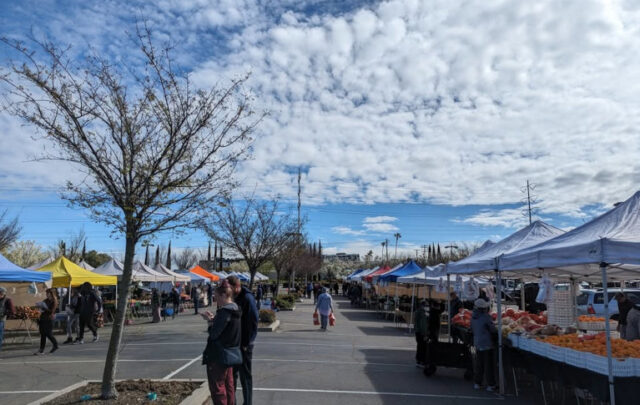This is part of an ongoing series in which we will feature ways Post Growth is in action already. The intention of this series is to inspire ideas about how to engage intentionally in our communities. Please visit our Post Growth in Action web page for more.
One of the many fantastic initiatives going on in my city which I consider to be forerunners of the post-growth economy is the Brighton Food Waste Collective. This community group collects surplus food from wholesalers and other businesses, holds free public feasts and other community events, and donates the food to charities which tackle food poverty. In the UK, we have an insane situation where on the one hand 3.5 million tonnes of perfectly good food is thrown away every year, while on the other 2 million Brits are malnourished, with 500,000 now reliant on food-banks, and that number is rising. The Food Waste Collective helps people in need, diverts food from going to landfill (meaning less emissions from agriculture and landfill) and helps build a stronger sense of community in the process. It’s really a win on all fronts.
Several times each year they hold a Good Food for Good Causes event, where they set up stalls in a public place and invite charities and other community groups to come and collect parcels of dry foods such as rice, flour, sugar, oats and pulses, plus fresh fruit and vegetables and bakery goods. They held one of these events on Monday the 24th November, and I had the pleasure of going down there and speaking to Vera, one of the co-founders of the group. She is also the co-ordinator of the Brighton branch of the national Love Food Hate Waste campaign. She told me this issue is so important to her because “food is the Earth’s gift to us, and it’s unimaginable for me to see so much of it go to waste without doing something about it, not the least at a time when more and more people are turning to food banks just to get by.”
Monday’s event was held in the Open Market, a newly renovated space in central Brighton for independent shops selling local produce and crafts. Over 30 different charitable groups were invited to come and collect the food, including community-run food banks and day centres feeding the homeless. I didn’t get to meet them however, as I was passing by in the morning while they were still setting up. Vera was writing on chalkboards while we chatted, and a dozen or so other volunteers were bustling around pouring sacks of quinoa into paper bags, weighing sugar and writing labels.
Around eight people form the core Food Waste Collective team, with about 40 regularly helping out at events and up to an impressive 200 volunteers are signed up in total. The Collective has been running since June 2013, and the seasonal Good Food for Good Causes event was sparked when a local health-food wholesaler got in touch wanting to know where they could donate surplus food. Over the last year they have diverted eight tonnes of perfectly good food into hungry tummies instead of landfill.
Apart from the Good Food for Good Causes, they also hold other kinds of events, such as the recent free Harvest Feast at the annual Brighton Lantern Fayre. The Food Waste Collective teamed up with two other like-minded groups to feed hundreds of people delicious free hot meals, made entirely from surplus food donated by local businesses and farms.
What I love most about this project is the way it delivers multiple benefits at once. Rather than just dealing with either food waste or food poverty, it takes notice of the very obvious link and joins the dots. Of course, I would hope there wouldn’t be much of either in a post-growth economy. But we cannot start the new economic system with a clean slate – we have to work from where we are. As Vera says, “surplus food is not the answer to food poverty, but it is our moral imperative to attend to food waste and human need if we have the opportunity to do so.”
I also love the way they’re a grass-roots, community-run, bottom-up initiative that connects local people – volunteers, business-owners and those struggling to afford decent food. In this way, the events they run don’t just help to tackle two important practical problems. They also have a less tangible but nevertheless powerful effect on social cohesion and community resilience – bringing people together to solve communal problems in the most positive way, while also learning to view food as something to be celebrated, appreciated and shared.
~
Photo: I took this at the Good Food for Good Causes event., Showing volunteers packaging food for the charities to collect.







